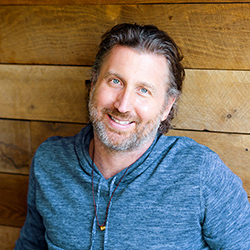 Sometimes it takes a shock to jolt us out of unhelpful habits. For Jason Garner, it was the premature death of his mother. He was 37 at the time and the loss hit him hard.
Sometimes it takes a shock to jolt us out of unhelpful habits. For Jason Garner, it was the premature death of his mother. He was 37 at the time and the loss hit him hard.
“I cried. I went to therapy, a lot of therapy, and I started to really understand the programming that made up ‘Jason’,” he told me in our Expert Interview podcast.
Through that journey of discovery, which spanned continents and belief systems, Garner transformed his life from “one of matter to one that matters” – a phrase that appears in the subtitle of his book “…And I Breathed.”
It’s a collection of autobiographical essays that highlight key moments in his career, which began in a flea market in Arizona and ended with Garner running the global music division at Live Nation, the world’s largest concert promoter. Anyone who likes heart-warming, rags-to-riches stories will enjoy this thoughtful book.
With grace and humor Garner told me about the ups and downs of this journey, bringing the pivotal moments to life with vivid detail.
In the flea market, he started out as a lowly parking attendant and gradually worked his way up to supervisor level. It was here that he first tried running his own business, booking local bands to play at a makeshift stage at the market.
“I arrived at that job with a storyline of poverty from my family and I graduated from that job really understanding that I could be an entrepreneur,” he said. “All it took was some courage and just finding something that people wanted that I could buy at the right price and could sell for a little bit more. And that’s been the story of my life. That was my business school.”
A chance meeting in an elevator in Las Vegas brought the young Garner into the orbit of boxing superstar Julio Cesar Chavez. The friendship that grew between these two opened doors for Garner, who was soon promoting leading Hispanic artists, including the singer Enrique Iglesias.
Despite his success as an independent promotor, Garner chose to swap the freedom and control of self-employment for a stable job in a global corporation: Clear Channel Entertainment, which he joined as lead booker for the Latin division. It can’t have been an easy decision, so I asked him what he’d learned from that transition.
“I learned there was still a little boy in me who didn’t want to be told what to do, and that I had a lot of growing up to do,” he admitted. “I took some knocks, to knock some of the arrogance out of me and teach me that success really comes from teamwork.”
He also discovered the benefits of having a “mosaic of mentors,” speaking fondly of his “first guru,” Michael Rapino, who helped him “grow up” in the way that he approached business and other people.
Rapino provided Garner with an anecdote he returned to again and again throughout his career. It dates from Rapino’s time as a marketing executive at the beer company Labatt’s.
“Michael had been moving his way up through the ranks and the company was expanding into South America. He was given the job of building the marketing strategy for that expansion,” Garner said.
“So he built the kind of strategy that you would imagine. It had neon signs and beer models in it, and all the things that we’re used to seeing around beer marketing. He put it into a great presentation to his mentor, a man named Hugo Powell. Hugo listened to the whole presentation and Michael was so proud of himself. Then Hugo said, ‘What’s the one thing that we need to be successful in this marketplace?’ Michael said, ‘Well that’s easy: we need the owners of these little mom-and-pop liquor stores to give us space in their coolers. And Hugo looked at him and said, ‘Then why don’t we spend all the money on coolers?'”
The coolers were branded Labatt’s and given free to store owners to provide extra capacity for the beer. This benefited everyone involved and delivered a much better result for the company than any number of neon signs and inflatable beer bottles could have done.
For Garner, the coolers are an analogy for the simple solutions that lie at the heart of any problem, if only we can see them. “We get so caught up in the processes that we believe are the way to do things, because we see everybody else doing them in a certain way. But often, behind that is a really simple solution. If we just look, we can find the coolers in every situation.”
The point of Garner’s book is to share what he learned as he left one kind of life behind and embraced another – one built on mindfulness, befriending himself, and compassionate engagement with others. The two kinds of life may not seem to have much in common except the person living them and, for Garner, that’s where the journey starts.
He explains how in this audio clip, from our Expert Interview podcast.
Listen to the full Expert Interview in the Mind Tools Club ¦ Install Flash Player.
In the full interview, Garner shares his tips for reprogramming unhealthy habits, and talks more about the benefits of mentors in his life. What changes would you make to live a life that matters more? Share your thoughts and experiences below.





Comments
Yolande Conradie says
9 years agoLiving a life that matters...it's something deep to think about and something we should constantly think about. What can you do to make sure you live a life that matters?